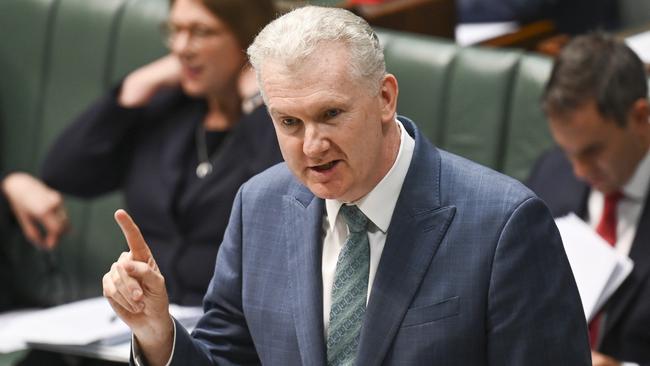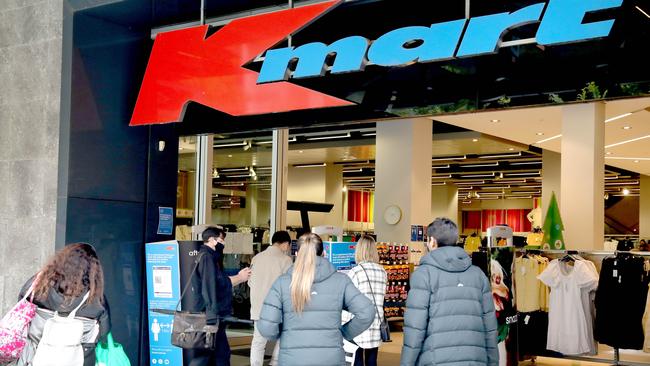Industrial relations reforms will threaten jobs, says Kmart managing director Ian Bailey
Kmart Group boss Ian Bailey has told the 2024 CEO Survey that he believes poorly crafted IR laws being pushed by the federal government pose a threat to jobs.

Ian Bailey, the managing director of the nation’s largest department store chains Kmart and Target, says new industrial relations reforms will neither reduce complexity in the workplace nor deliver a kick to productivity in Australia.
Instead Mr Bailey says the federal government’s laws could threaten employment growth.
Participating in the The Australian’s 2024 CEO Survey, Mr Bailey said customers, from high-income earners to low-income households, were changing their shopping habits to reflect the rising cost of living.
He expected that in the year ahead the Australian economy would experience a small increase in unemployment and immigration would stabilise or even reduce slightly, which would offset the decline in individual spending levels and consumer expenditure tightening in 2024.
In the wake of the federal government just before Christmas winning legislative support for labour hire changes, new rights for union delegates and the criminalisation of wage theft following a surprise deal between the government and the Senate crossbench, Mr Bailey said other reforms on the agenda could do more harm than good.
“Much-needed industrial relations reforms are currently being contemplated. Unfortunately, the current proposed reforms will do little to reduce complexity in an already complex system, nor will they contribute to increased productivity in the wider economy – both of which are very much needed,” Mr Bailey told the survey.
“Undertaken correctly, we can return to an environment where effective bargaining between team members and employers delivers beneficial outcomes for all stakeholders, which should always be our starting point.
“As society and customer behaviour changes, this is important for businesses to evolve effectively.”

Mr Bailey underlined the importance of industrial relations reforms that also maintained flexibility in the workplace and for employers.
He said taking a casual job at Kmart or Target after school or while working through university or TAFE was how many Australians began their career – and it was a path that created economic opportunity for a diverse mix of people from across the full socio-economic spectrum.
“What we don’t want to see is reform that ends up resulting in fewer people being employed because we can’t offer the same flexibility or choice to team members,” he said.
“Casual positions are common in retail because they provide the flexibility needed for both the team member and the business.
“What’s important to us is ensuring that team members can still have the right to choose – at the same time as having clear and fair pathways for a team member to request a casual conversion to a permanent position. That balance is an important and constructive principle that is worth the investment of effort in getting right.”
Key Senate crossbenchers have declared the government’s changes to casual employment and the gig economy must not add more red tape for small business, as employers prepare to seek new amendments to Labor’s industrial relations bill.
Ahead of the government seeking to pass the second part of its Closing Loopholes Bill from February, Senator Jacqui Lambie said she would spend most of early January going over the workplace law changes “with a fine-tooth comb”.

“My worry with the more complex parts of the legislation is that our economy is fragile, and changes to casualisation and the ‘gig’ economy need to be carefully considered,” Senator Lambie said.
Turning to the broader economy, Mr Bailey said higher interest rates combined with inflation have had a “material impact on consumers” and many were experiencing these dynamics for the first time.
For these and other shoppers across the income spectrum they were focused on maintaining their lifestyles in the face of tougher economic conditions,” Mr Bailey said.
“With mortgage repayments and rent becoming a much larger cost, consumers are becoming increasingly creative to maintain the lifestyle they aspire to. In this context, value has become and will continue to be a critical driver for consumer spending. We are seeing this behaviour across all income levels in retail, which demonstrates that these same drivers are important for the vast majority of Australians.
“We are undoubtedly in a period of significant disruption due to the cost of living pressures facing Australian households, but with disruption comes the opportunity for significant innovation.
“New business models will emerge finding new ways to deliver value to customers and there is potential for material market share gains and losses.”

Of the national ambition to meet 2030 targets for a 43 per cent reduction in baseline emissions Mr Bailey said a successful energy transition would demand unprecedented levels of collaboration between governments, consumers and industry to meet commitments under the Paris Agreement.
“We all must play our part in that. We know this is an issue that matters to our customers, and our communities want to see real action on climate,” he said.
“Kmart is committed to achieving net-zero emission from our own operations from 2030, and 100 per cent of the electricity used in our own operations will be from renewable sources by July 2025.
“That will come from reducing energy use and using more energy efficient technologies across our stores and distribution centres, working with landlords to generate more energy from behind-the-metre solutions like solar panels, but also looking for ways to collaborate and create demand for greener services in our facilities, such as airconditioning systems with a lower emissions footprint.”
As for the contentious issue of staff working from home or requiring them to come back into the office, Kmart and Target was finding the right balance between flexibility and ensuring staff weren’t isolated at home, he said.
But Mr Bailey expected that workers would spend more time in the office in 2024.
“One of the positive things that came out of the pandemic was the opportunity to set a new operating rhythm – and facilitate greater flexibility amongst Australian workplaces,” Mr Bailey said.
“We also know that flexible work practices have a positive impact on diversity and inclusion, notably increasing engagement with female leaders and emerging talent. Equally, the isolation that can occur for those who work from home frequently is a real problem for mental health as well as the essential skill development required to progress careers.
“2024 will see an increase in the amount of time spent in the office and a greater clarity of the long-term ramifications of high levels of working from home for both individuals and businesses.”








To join the conversation, please log in. Don't have an account? Register
Join the conversation, you are commenting as Logout